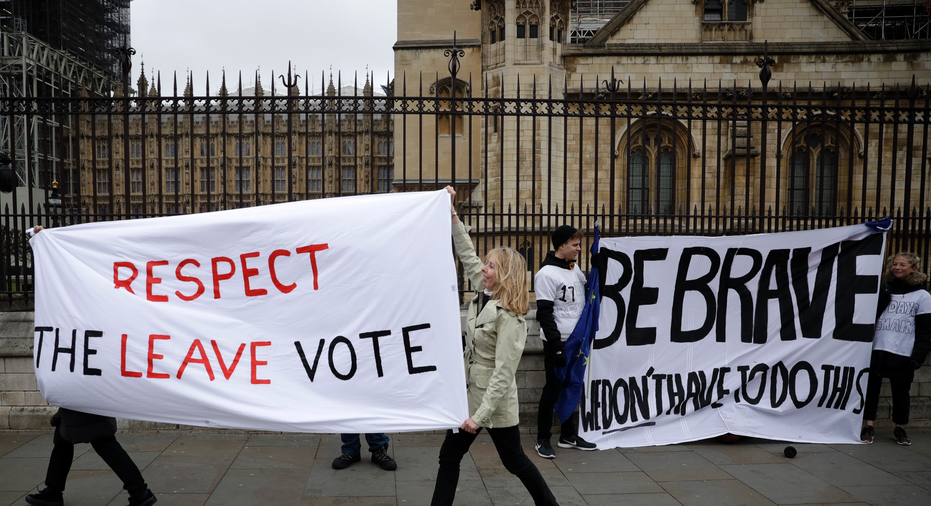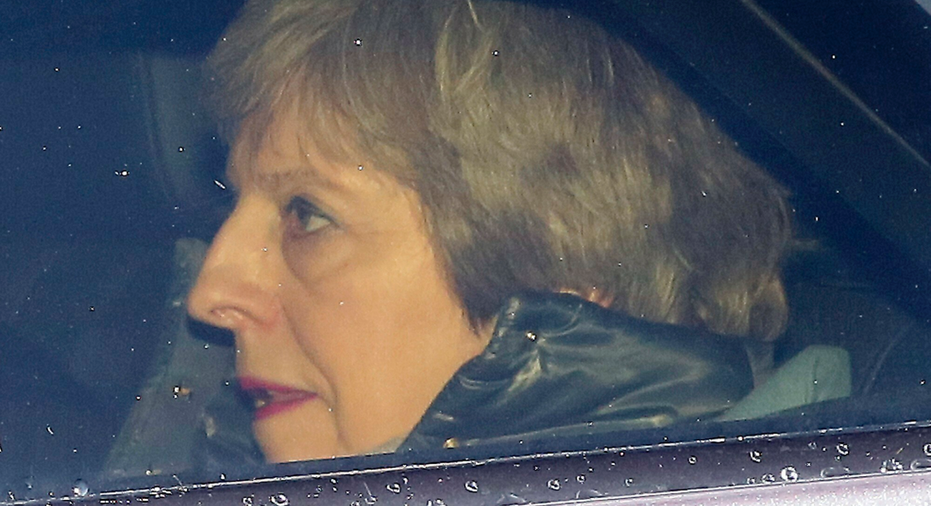The Latest: Brexit booster Farage expects yearlong delay
Pro-Brexit leave the European Union supporters, left, and anti-Brexit remain in the European Union supporters take part in a protest outside the Houses of Parliament in London, Tuesday, March 12, 2019. British Prime Minister Theresa May faced continued opposition to her European Union divorce deal Tuesday despite announcing what she described as "legally binding" changes in hopes of winning parliamentary support for the agreement. (AP Photo/Matt Dunham)
LONDON – The Latest on Brexit (all times local):
8:50 p.m.
Nigel Farage, the British politician who became the public face of anti-European Union sentiment in the run-up to a 2016 Brexit referendum, thinks the country's departure date could be pushed back by a year.
Farage said during an interview with The Associated Press after Parliament voted down Prime Minister Theresa May's latest divorce deal with the EU on Tuesday that the U.K.'s political chaos and EU's upcoming legislative elections preclude a smooth withdrawal any time soon.
Farage said: "Let's be realistic. We've got a new European Parliament coming in...."I don't see the next phase of (Brexit) negotiations even starting until November. So I would say that the extension, realistically, has to be a year."
As leader of the euroskeptic U.K. Independence Party, Farage campaigned for Brexit. He represents the party in the EU parliament and says a 12-month postponement might mean the U.K. has to take part in the May elections.
He says he'd rather not go through another campaign, but 'If we've got to fight more European elections, I will fight them."
___
8:05 p.m.
The European Union says the British Parliament's rejection of a revised divorce deal "has significantly increased the likelihood of a 'no-deal' Brexit."
The EU and its 27 other member countries said in a statement Tuesday night after the House of Commons voted 391 to 242 against the latest withdrawal deal that they "have done all that is possible to reach an agreement."
The statement says the European Commission and EU members will continue to prepare for Brexit happening without a deal in place and "ensure that we will be ready if such a scenario arises" on March 29.
The EU says it will "expect a credible justification" if the UK asks to postpone its departure.
___
7:30 p.m.
British Prime Minister Theresa May has confirmed that Parliament will get to decide between leaving the European Union with no deal and delaying Brexit.
May says she "profoundly regrets" the House of Commons rejection of her deal Tuesday and said delaying Britain's departure won't solve the underlying problem.
She says Parliament will be given a chance to "decline" leaving the EU without a deal on March 29 in a Wednesday vote.
If that is the choice, Parliament will decide Thursday whether to seek an extension that would delay Britain's departure date.
May cautions that the EU will need a reason to approve a delay.
___
7:20 p.m.
Britain's Parliament has dealt a major blow to Prime Minister Theresa May, resoundingly rejecting her Brexit deal just 17 days before the U.K. is due to leave the bloc.
Lawmakers voted by 391 to 242 against the deal, the second time they have defeated it.
The House of Commons threw out the agreement by an overwhelming majority in January, sending May back to the EU to seek changes.
On Monday, May said she had secured "legally binding" changes to allay lawmakers' fears — but it wasn't enough.
Lawmakers will now vote on whether to leave the EU without a deal on the scheduled date of March 29, or to ask the bloc to postpone Britain's departure.
___
2:35 p.m.
Northern Ireland's Democratic Unionist Party says it won't back U.K. Prime Minister Theresa May's revamped divorce deal from the European Union.
The party, which plays a pivotal role in the Brexit votes in Parliament because of the prominence of the Northern Ireland border with EU member Ireland, said in a statement that May had made "limited" progress. However, it added that in its view "sufficient progress has not been achieved at this time."
May has long courted the party's support because she needs its 10 votes to win a majority in Parliament.
May had announced changes on Monday designed to overcome lawmakers' concerns about provisions designed to ensure the border on the island of Ireland remains open after Brexit.
The so-called backstop is an insurance mechanism that would be implemented only if Britain and the EU can't agree on the terms of their future relationship in the second phase of negotiations.
___
2:10 p.m.
British Prime Minister Theresa May has implored lawmakers to back her EU divorce agreement, telling them that "if this deal is not passed then Brexit could be lost."
May — her voice reduced to a raw whisper after days of frantic Brexit diplomacy — spoke as the House of Commons began debating the deal before a vote later Tuesday.
She said she had secured "improvements" from the European Union to the deal that lawmakers rejected in January.
But many pro-Brexit lawmakers still think the agreement keeps Britain bound too closely to the EU and say they plan to vote against it.
Britain is due to leave the bloc in less than three weeks, on March 29.
___
1:45 p.m.
German Chancellor Angela Merkel says the European Union made "clear, far-reaching proposals" to address Britain's concerns about its withdrawal deal.
Merkel said at a brief news conference in Berlin with visiting Belgian Prime Minister Charles Michel that "today is an important day" and she will watch closely what happens in Britain this week. She stressed that "we want an orderly British withdrawal."
She said that "we made an effort to address British sensitivities, British wishes and British concerns." Before a British Parliament vote Tuesday on the withdrawal agreement, Merkel didn't address the assessment by Britain's attorney general that last-minute changes secured from the EU didn't give Britain the power to cut itself free of ties to the bloc.
Merkel deflected a question on whether she was prepared to delay the Brexit deadline. She said that the British Parliament is holding votes this week — "we will now wait for these votes and then we will decide."
___
1:15 p.m.
An influential group of Brexit-backing lawmakers in Britain says it won't vote for Prime Minister Theresa May's EU divorce deal because changes she has secured are not good enough.
The European Research Group of Conservative Brexiteers says its lawyers looked at the documents and found them wanting.
Group member Bill Cash says "we do not recommend accepting the government's motion today."
The announcement is another blow to May's deal, after Attorney General Geoffrey Cox said last-minute changes did not eliminate the risk Britain could be trapped in EU rules against its will.
The House of Commons is due to vote later on whether to approve or reject the deal.
___
12 p.m.
The head of the European Parliament says the European Union will not make further concessions to Britain after the country's attorney general failed to fundamentally alter his legal advice on Prime Minister Theresa May's revised deal.
EU Parliament President Antonio Tajani said the problems raised by the attorney general are "an internal problem of the U.K." and would not prompt the EU to reconsider the Brexit deal again.
"We are very clear It is impossible to change our position," Tajani said after he heard about the objections.
May hoped that concessions she got from the EU late Monday would be enough to prompt Attorney General Geoffrey Cox to alter his advice that the country could end up being tied indefinitely in a customs union with the EU after Brexit.
He still hoped U.K. lawmakers would back the withdrawal agreement later.
___
11:30 a.m.
The pound has slumped by more than 1 percent against the dollar after the British Attorney General's assessment of Prime Minister Theresa May's reinforced expectations that lawmakers will reject it.
In a letter outlining his thoughts over May's latest Brexit deal, Geoffrey Cox said the latest concessions from the EU don't eliminate the risk the country will remain entwined with the EU customs union indefinitely.
His advice suggests that many lawmakers who have opposed May's deal are unlikely to change the way they vote in Parliament later. That raises the prospect of more uncertainty, including a potential delay to Brexit.
Minutes after Cox's advice, the pound was 1.1 percent lower at $1.3014, almost two cents down from where it was earlier. The fall means the pound has given up all the gains in made after May claimed she had secured "legally binding" changes to the withdrawal agreement.
David Cheetham, chief market analyst at XTB, said it now "looks like any hopes of an unlikely victory for the PM's deal later have just been extinguished."
___
11:15 a.m.
Britain's attorney general says changes to the Brexit divorce deal secured by Prime Minister Theresa May don't eliminate the risk the country will remain entwined with European Union rules indefinitely.
Geoffrey Cox says the changes "reduce the risk that the United Kingdom could be indefinitely and involuntarily detained" in a part of the withdrawal agreement known as the backstop.
But he says they don't give the U.K. an "internationally lawful means" of getting out of the arrangement without the EU's approval.
The opinion is a blow to May's hopes of persuading pro-Brexit lawmakers to vote for her deal in Parliament on Tuesday.
The Brexiteers feel the backstop, designed to maintain an open Irish border, could trap Britain in lockstep with EU rules.
___
10:50 a.m.
Germany and other EU nations welcomed the overnight agreement reached between European Commission President Jean-Claude Juncker and British Prime Minister Theresa May as a last-ditch effort to avoid a chaotic Brexit at the end of the month.
Arriving in Bucharest, most EU European affairs ministers were upbeat about the deal which will be voted upon by the U.K. parliament Tuesday night.
Germany's EU affairs minister, Michael Roth, called it "a far-reaching compromise. For the EU it's of utmost importance that the integrity of the single market be preserved, and that there be no hard border between Northern Ireland and Ireland."
He called on the House of Commons to accept the deal "because I don't see further chances for negotiations."
Dutch Prime Minister Mark Rutte tweeted that he was "pleased with the agreement" and implored that British legislators approve the deal. "An orderly #Brexit is crucial for both the EU and the UK," Rutte tweeted. "There is no alternative."
European Affairs Minister George Ciamba of Romania, which has the EU presidency, held out "hope this will be a game changer...but we shouldn't pre-judge the outcome of the vote in the Commons...a disorderly exit would be the worst scenario.'
Luxembourg Foreign Minister Jean Asselborn called it "the last chance to avoid a no-deal."
___
8:50 a.m.
British Prime Minister Theresa May is facing continued opposition to her European Union divorce deal despite "legally binding" changes that she hopes will win parliamentary support for the agreement.
The House of Commons will vote later Tuesday after last-minute talks with the EU produced assurances that May said means the deal couldn't be used to tie Britain to the bloc indefinitely.
Both Keir Starmer, the opposition Labour Party's Brexit spokesman, and Conservative lawmaker Dominic Grieve expressed skepticism about whether May had won substantive concessions.
May flew to Strasbourg, France, late Monday for talks with European Commission President Jean-Claude Juncker. At a news conference, they announced changes designed to overcome lawmakers' concerns about provisions designed to ensure the border between EU member Ireland and Britain's Northern Ireland remains open after Brexit.
___
Follow AP's full coverage of Brexit at: https://www.apnews.com/Brexit





















